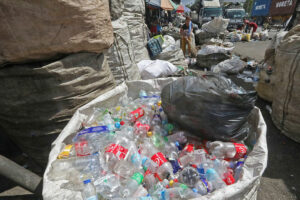CONSERVATION GROUP World Wildlife Fund (WWF) said it has set a target for reducing plastic waste leakage into the oceans of 30% by 2025 via reduction in plastic use as well as improved recycling and collection.
“That involves a whole system-wide approach from reducing the use to increasing circularity and then improving our collection,” WWF Philippines Executive Director Katherine P. Custodio said in a media conference on Tuesday.
According to Ms. Custodio, reducing plastic waste leaking into the oceans is “achievable” but the effort needs to be national.
“What we are seeing now, with the partnership we have with local government units (LGUs) and also with the ports, that these partners are committed to do their 30% reduction by 2025 and working towards eliminating leakage in nature,” she said.
“We have long way to go because we are only working with 10 LGUs at present so it’s really about how do we scale up that work because we need to reach so much,” she added.
The WWF’s Plastic Smart Cities program engages local organizations in reduction, reuse, and upcycling activities, as well as in building materials recovery facilities.
It is currently working with the city of Manila, Batangas City, Donsol, Sorsogon, Taytay, Palawan, Davao City, Samar province, San Isidro, Davao Oriental, the Siargao municipalities of Del Carmen and General Luna in Surigao del Norte, and Cagayan de Oro City.
Its port partners are Manila’s North Harbor, the Port of Batangas, and the Port of Cagayan de Oro.
Gilbert C. Gonzales, assistant secretary of the Department of Environment and Natural Resources (DENR), said a combined effort is required to achieve the targeted reduction.
“There are many sectors involved here. It’s not just an effort of the DENR or government, together with us is the private sector, the industries, and all other sectors,” he said.
He said that the government is addressing the issue of marine litter through a national plan of action, whose goal is zero waste in the Philippine waters by 2040.
In a keynote speech during an event on Tuesday, Environment Secretary Maria Antonia Yulo-Loyzaga said Republic Act No. 11898 or the Extended Producers’ Responsibility (EPR) law is a “concrete start and a strategic approach” to waste reduction.
“EPR has been proven to address (waste generated by) packaging… meaningfully through various EPR schemes and certainly these require companies to pay for collection, sorting, and recycling of their plastic packaging,” she said.
She said that the Philippines generates approximately 61,000 metric tons of solid waste daily. The estimated daily volume of plastic sachets is over 163 million, along with 48 million shopping bags, and 45 million thin-film bags.
Some 33% of these items are disposed of in landfills and dumpsites while around 35% leaks into the environment. — Sheldeen Joy Talavera

